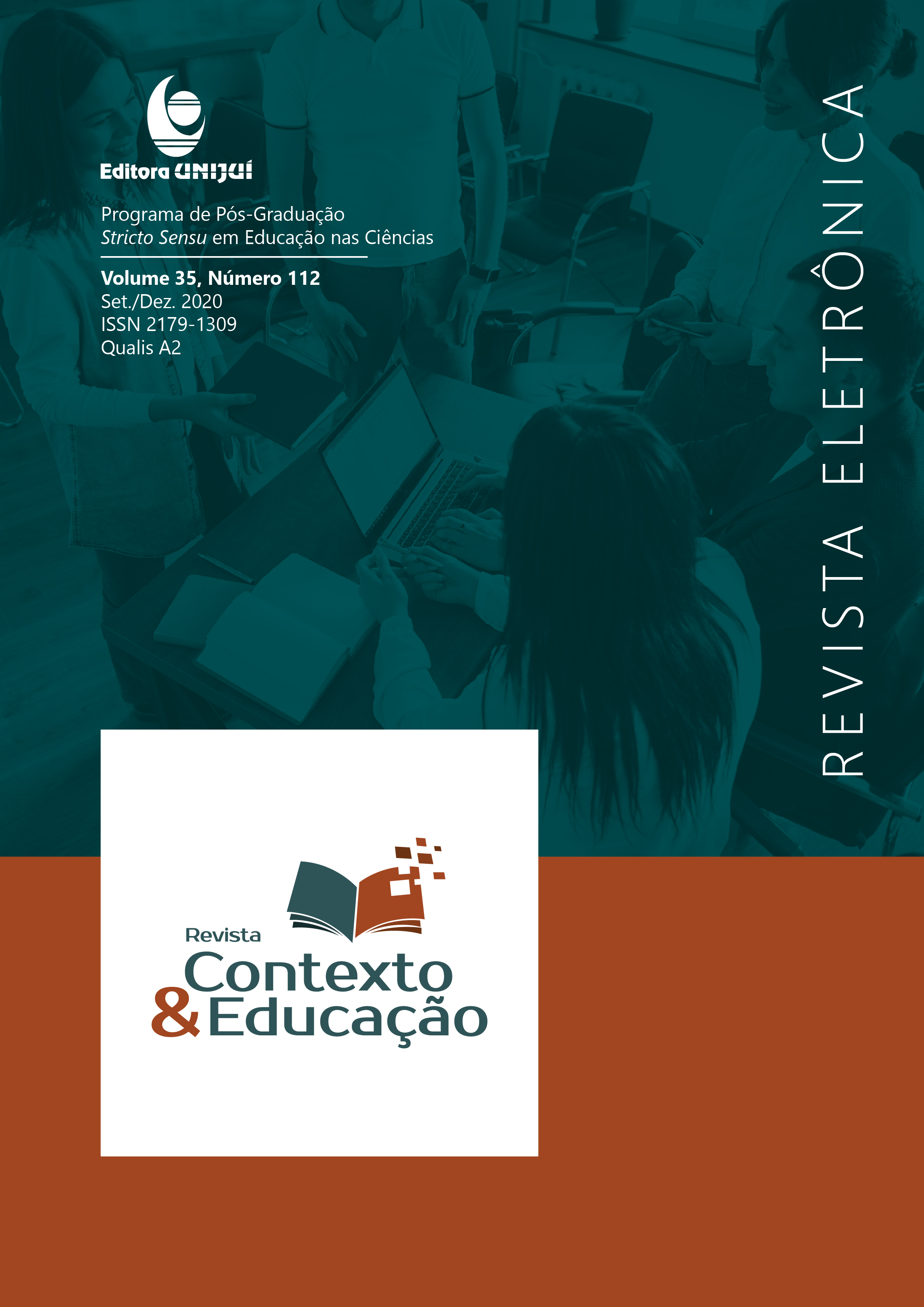HISTÓRIA E CONTEXTUALIZAÇÃO NO ENSINO DE ESTEREOQUÍMICA: UMA PROPOSTA DE ABORDAGEM PARA O ENSINO MÉDIO
DOI:
https://doi.org/10.21527/2179-1309.2020.112.432-455Palavras-chave:
História da ciência. Estereoquímica. Contextualização. Teoria dos Campos Conceituais.Resumo
Os desafios do ensino de estereoquímica têm sido objeto de estudo há décadas. A resolução de problemas em nível tridimensional é considerada como umas das fontes de dificuldade. Além disso, a falta de motivação para a aprendizagem é uma barreira para o ensino de química. Buscando uma estratégia de ensino e tendo como aporte a Teoria dos Campos Conceituais, a qual pressupõe que um conceito se torna significativo para o sujeito a partir de uma variedade de situações, realizou-se um estudo de caso exploratório com estudantes de Ensino Médio Técnico em Química. O estudo relatado é um recorte de uma pesquisa de doutorado e aborda, exclusivamente, o impacto no nível de compreensão da área, mediante o uso de uma unidade didática, utilizando um enfoque nas questões históricas e contextuais. Utilizando o método misto e análise de conteúdo, constatou-se, por meio de pré e pós-testes, que o uso de unidade didática possibilitou aos estudantes a compreensão de uma variedade de situações, aumentando seu repertório de conhecimento, o que torna o conceito significativo e colabora para a motivação em sala de aula. Essa significação e motivação podem colaborar para o domínio do campo da estereoquímica e para superação das dificuldades exclusivas da área.
Os desafios do ensino de estereoquímica têm sido objeto de estudo há décadas. A resolução de problemas em nível tridimensional é considerada como umas das fontes de dificuldade. Além disso, a falta de motivação para a aprendizagem é uma barreira para o ensino de química. Buscando uma estratégia de ensino e tendo como aporte a Teoria dos Campos Conceituais, a qual pressupõe que um conceito se torna significativo para o sujeito a partir de uma variedade de situações, realizou-se um estudo de caso exploratório com estudantes de Ensino Médio Técnico em Química. O estudo relatado é um recorte de uma pesquisa de doutorado e aborda, exclusivamente, o impacto no nível de compreensão da área, mediante o uso de uma unidade didática, utilizando um enfoque nas questões históricas e contextuais. Utilizando o método misto e análise de conteúdo, constatou-se, por meio de pré e pós-testes, que o uso de unidade didática possibilitou aos estudantes a compreensão de uma variedade de situações, aumentando seu repertório de conhecimento, o que torna o conceito significativo e colabora para a motivação em sala de aula. Essa significação e motivação podem colaborar para o domínio do campo da estereoquímica e para superação das dificuldades exclusivas da área.
Downloads
Publicado
Como Citar
Edição
Seção
Licença
Ao publicar na Revista Contexto & Educação, os autores concordam com os seguintes termos:
Os trabalhos seguem a licença Creative Commons Atribuição 4.0 Internacional (CC BY 4.0), que permite:
Compartilhar — copiar e redistribuir o material em qualquer meio ou formato;
Adaptar — remixar, transformar e criar a partir do material para qualquer fim, inclusive comercial.
Essas permissões são irrevogáveis, desde que respeitados os seguintes termos:
Atribuição — os autores devem ser devidamente creditados, com link para a licença e indicação de eventuais alterações realizadas.
Sem restrições adicionais — não podem ser aplicadas condições legais ou tecnológicas que restrinjam o uso permitido pela licença.
Avisos:
A licença não se aplica a elementos em domínio público ou cobertos por exceções legais.
A licença não garante todos os direitos necessários para usos específicos (ex.: direitos de imagem, privacidade ou morais).
A revista não se responsabiliza pelas opiniões expressas nos artigos, que são de exclusiva responsabilidade dos autores. O Editor, com o apoio do Comitê Editorial, reserva-se o direito de sugerir ou solicitar modificações quando necessário.
Somente serão aceitos artigos científicos originais, com resultados de pesquisas de interesse que não tenham sido publicados nem submetidos simultaneamente a outro periódico com o mesmo objetivo.
A menção a marcas comerciais ou produtos específicos destina-se apenas à identificação, sem qualquer vínculo promocional por parte dos autores ou da revista.
Contrato de Licença (para artigos publicados a partir de outubro/2025): Os autores mantém os direitos autorais sobre seu artigo, e concedem a Revista Contexto & Educação o direito de primeira publicação.


